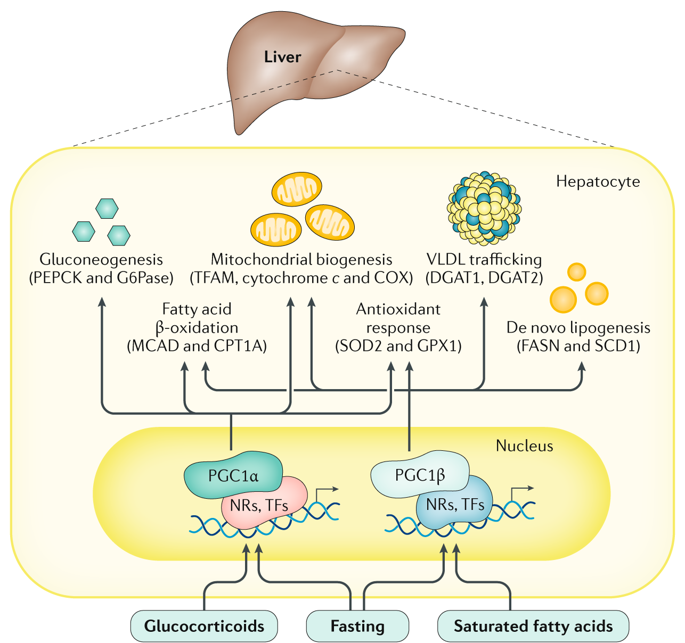Nature Reviews Gastroenterology & Hepatology ( IF 45.9 ) Pub Date : 2018-12-05 , DOI: 10.1038/s41575-018-0089-3 Elena Piccinin 1, 2 , Gaetano Villani 3 , Antonio Moschetta 1, 4

|
Alterations of hepatic metabolism are critical to the development of liver disease. The peroxisome proliferator-activated receptor-γ coactivators (PGC1s) are able to orchestrate, on a transcriptional level, different aspects of liver metabolism, such as mitochondrial oxidative phosphorylation, gluconeogenesis and fatty acid synthesis. As modifications affecting both mitochondrial and lipid metabolism contribute to the initiation and/or progression of liver steatosis, nonalcoholic fatty liver disease (NAFLD), nonalcoholic steatohepatitis (NASH) and hepatocellular carcinoma (HCC), a link between disrupted PGC1 pathways and onset of these pathological conditions has been postulated. However, despite the large quantity of studies, the scenario is still not completely understood, and some issues remain controversial. Here, we discuss the roles of PGC1s in healthy liver and explore their contribution to the pathogenesis and future therapy of NASH and HCC.
中文翻译:

NAFLD、NASH 和肝细胞癌的代谢方面:PGC1 共激活因子的作用
肝脏代谢的改变对肝脏疾病的发展至关重要。过氧化物酶体增殖物激活受体-γ 共激活因子 (PGC1) 能够在转录水平上协调肝脏代谢的不同方面,例如线粒体氧化磷酸化、糖异生和脂肪酸合成。由于影响线粒体和脂质代谢的修饰有助于肝脏脂肪变性、非酒精性脂肪性肝病 (NAFLD)、非酒精性脂肪性肝炎 (NASH) 和肝细胞癌 (HCC) 的发生和/或进展,因此 PGC1 通路被破坏与这些疾病的发作之间存在联系病理状况已被假设。然而,尽管进行了大量研究,但该情景仍未完全了解,一些问题仍存在争议。这里,































 京公网安备 11010802027423号
京公网安备 11010802027423号